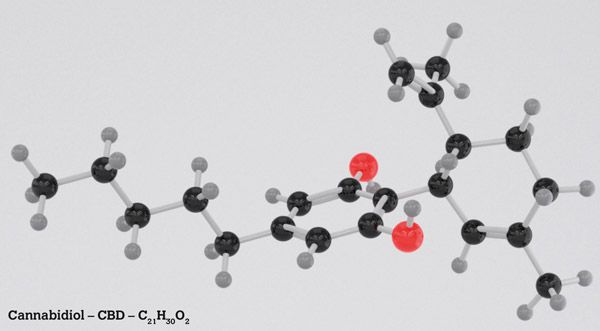UCD Research - June 2022
Oral cannabinoids and osteoarthritis pain management in dogs
The University College Dublin Veterinary Hospital will be investigating the potential use of oral cannabinoids (cannabidiol and tetrahydrocannabinol) for chronic pain related to osteoarthritis in dogs. A pilot study looking at the effect of this product on a population of dogs diagnosed with chronic pain secondary to osteoarthritis using multiple objective assessment methods will be conducted
In association with


Dr. Marie-Pauline Maurin
DVM, DVMS, Dip ECVS, EBVS European Veterinary Specialist in Small Animal Surgery
Several canine orthopaedic conditions (i.e., elbow dysplasia, cranial cruciate ligament disease, hip dysplasia) lead to the development of osteoarthritis even after surgical treatment. Chronic pain and subsequent lameness are the predominant clinical signs of osteoarthritis in dogs. The pathology of joint destruction in arthritis is driven by, notably, inflammatory cytokines (mainly TNF-α; IL-1β; IL-6) and neutrophils mediation (Kapoor et al, 2010).
Background studies
In vitro and on rodent models, cannabidiol has been shown to significantly attenuate the production of pro-inflammatory cytokines IL-6 and TNF-α while elevating levels of anti-inflammatory IL-10 (Verrico et al, 2020). There are currently two clinical studies on dogs where administration of cannabidiol showed subjective increased mobility and decreased pain levels on osteoarthritic dogs (Verrico et al, 2020; Gamble et al, 2018). In an experimental study, it has also been shown that the inflammatory process in adjuvant induced arthritis was neutralised by oral administration of tetrahydrocannabinol with sesame oil in rats (Ismail et al, 2018). By decreasing pro-inflammatory cytokine levels to normal values, it may have a benefit on clinical signs related to arthritic changes. However, there is no clinical trial in dogs that evaluated the effect of oral administration of cannabinoids (cannabidiol and tetrahydrocannabinol) on osteoarthritis.
Importance of objective assessments Lameness score is a subjective form of gait analysis in dogs and cats, closely comparable to objective measurements only in cases of severe lameness (McLaughlin 2001). Objective, reproducible and reliable gait analysis can be performed using force plate systems and pressure walkway systems (Carr, 2016). The previous studies looking at the effect of oral administration of cannabidiol on osteoarthritis in dogs did not report or use objective gait analysis methods (Verrico et al, 2020; Gamble et al, 2018).

Study aims and design
The study aims to assess the effect of oral administration of cannabinoids in dogs diagnosed with osteoarthritis using mainly objective gait assessment and blood levels of inflammatory markers. The study will be randomised, double-blinded, and placebo-controlled with cross-over.
The dogs will be recruited through the UCD Veterinary Hospital, selected if the owner consents and the dog is confirmed with a diagnosis of any conditions leading to secondary osteoarthritis (by any type of imaging: radiographs, computed tomography (CT) scan, arthroscopy). These dogs will be included only if surgical intervention is not recommended, or owner declined surgical treatment (elbow dysplasia, hip dysplasia, stable CCLR with progressive OA, carpal/tarsal OA following trauma and owner declined arthrodesis). If the animal is already on other treatments and/or pain relief, they will be strictly continued during the entire study period.
The protocol will consist of two consecutive phases (blinded and randomised for each dog) corresponding to the cannabinoid product for four weeks and the placebo product for four weeks interrupted by a four-week wash out period, generating four appointments per dog in total in a period of three months in total. Temporospatial gait analysis using a force plate system will be performed at each appointment. C-reactive protein, IL-6 and TNF-α cytokines levels will also be collected.
This study will be conducted after full ethical approval and in collaboration with another university in the UK.
-
Kapoor M., Martel-Pelletier J., Lajeunesse D., Pelletier J-P., Fahmi H. Role of proinflammatory cytokines in the pathophysiology of osteoarthritis. Nature Reviews Rheumatology. 2011 Jan;7(1):33-42
-
Verrico C D. et al. A randomized, double-blind, placebo-controlled study of daily cannabidiol for the treatment of canine osteoarthritis pain. Pain. 2020 Sep 1;161(9):2191-2202.
-
Ismail M., Hasan H., El-Orfali Y., Ismail H. and Khawaja G. Anti-inflammatory, antioxidative, and hepatoprotective effects of trans 9-
-
Tetrahydrocannabinol/Sesame oil on adjuvant-induced arthritis in rats. Evidence-Based Complementary and Alternative Medicine. 2018 Jun 25;2018:9365464.
-
Gamble L-J. et al. Pharmacokinetics, safety, and clinical efficacy of cannabidiol treatment in osteoarthritic dogs. Frontiers in Veterinary Science. 2018 Jul 23;5:165.
-
Carr BJ, Dycus DL. Canine gait analysis. Today’s Veterinary Journal: Recovery and Rehab. Mar-Apr 2016:93–100.
In association with


Dr. Marie-Pauline Maurin
DVM, DVMS, Dip ECVS, EBVS European Veterinary Specialist in Small Animal Surgery
















